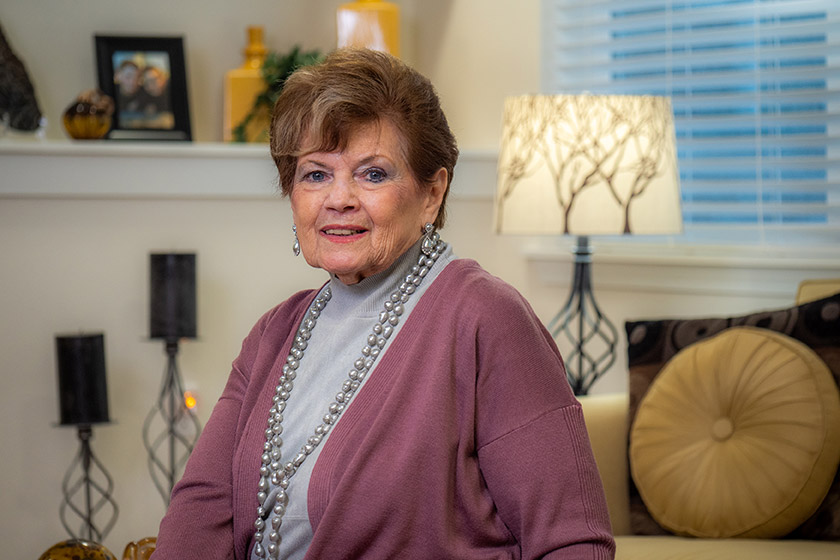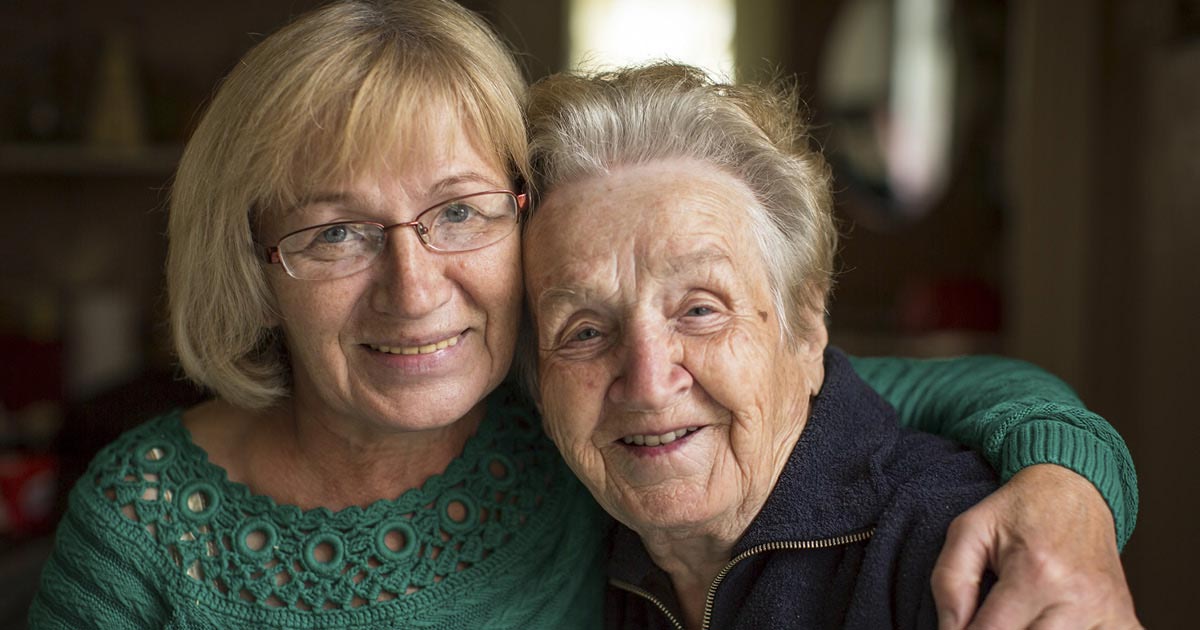Home. If just the sound of that word makes you feel all warm and cozy, you’re not alone. Three out of four adults aged 50 and older say they want to live in their own homes and in the same community as they grow older. The concept of “home” often holds a special place in our hearts. It is where cherished memories are created, where comfort and familiarity reside.
For many of us, the desire to age in place – to remain in our own home as we grow older – is a natural inclination. However, like any significant decision, there are both advantages and challenges to consider when opting for this path.
Right now, you may think that your current home is where your heart is. But before you make that decision, let’s consider what staying in your home would mean for you. In this article, we’ll explore the realities of aging in place, empowering you with insights to make an informed decision that resonates with your unique journey.
Statement of Fairness: Considering senior living options for yourself or a loved one? We’re here to help at every step. And even though we specialize in independent living communities, our goal is for YOU to find your best path to gracious retirement living, and part of how we achieve that is by providing reliable information on all types of senior living, not just the ones we offer. When our offerings serve as useful illustrations to a specific topic, you can find that information in the attached sidebar.
What Does Aging in Place Mean?
According to the Centers for Disease Control and Prevention, aging in place is “the ability to live in one’s own home and community safely, independently and comfortably, regardless of age, income, or ability level.” Everyone wants to be in control of their own lives, and being able to make that decision for yourself gives you a sense of satisfaction and peace of mind.

The Appeal Of Aging In Place
Aging in place holds undeniable appeal, as it allows us to stay in a familiar environment where we have likely built cherished memories over the years. The appeal extends beyond physical spaces; it’s about preserving the emotional sanctuary that home represents. Aging in place empowers individuals to maintain their independence, crafting routines and rhythms that resonate with their unique lifestyles.
It fosters the continuation of community bonds, enabling the cultivation of enduring relationships with neighbors and friends. While most of us dream of living out our days in the homes we love, there are many factors that can make aging in place difficult, and choosing to do so comes with certain costs that many don’t consider. Staying at home requires thoughtful preparation to ensure a safe, comfortable and supportive environment that caters to your evolving needs.
What Resources Are Available If I Choose To Remain At Home?
The services you will require depend on your health and your family support system. Check your local Area Agency on Aging. They can help with assistance finding resources such as:
- Meal deliveries, like Meals on Wheels
- Transportation options
- In-home health care agencies that offer medical services within a person’s residence, such as nurses, physical or occupational therapists or aides to assist with routine tasks
- Senior centers that offer events, programs and adult day services
- Health and wellness programs
- Referrals to legal agencies, contractors and more
Is Aging In Place a Good Idea?
When it comes to aging in place, every situation is different. You love your home for so many reasons. You’re proud of it. Living in your own home makes you feel independent and in control. But no matter how comfortable your home is, aging in place has its own challenges. So, if you aren’t sure aging in place is ideal for you, what should you do?
Having an open and honest heart-to-heart conversation with your family can be incredibly beneficial. This kind of dialogue can shed light on your loved ones’ thoughts and perspectives, which you might not have been aware of previously.
Recognizing that their concerns stem from their love and care for you can make the discussion more comfortable and constructive. It’s essential to keep in mind that as your health needs evolve, exploring options like home health care services or long-term care becomes crucial to ensure you receive the necessary medical attention and support.
What Are The Disadvantages Of Living At Home As An Older Adult?

Not all older adults encounter the same problems, but aging in place has disadvantages.
- Home maintenance. Household chores become increasingly challenging as both you and your home age together. Finding reliable help for household chores can be a hit-or-miss experience, making it harder to ensure your living environment remains comfortable and safe.
- Meals. Meal preparation becomes more complicated when cooking for just yourself or a small household. This often leads to skipping meals, resulting in inadequate nutrition and potential health issues.
- Transportation. As we age, transportation becomes a growing concern. Finding rides to appointments and going out to purchase essentials can be a daunting task, limiting our ability to maintain an active and independent lifestyle.
- Accessibility and safety. Getting older can cause our mobility and health needs to shift, making falls and accidents more prevalent. Aging in place may require you to implement safety measures to mitigate these risks. Modifying a home to accommodate these changes can be expensive and require extensive renovations, making it necessary to evaluate the feasibility of adapting the existing living space.
- Limited access to care. While aging in place allows independence, it can become a challenge when access to necessary health care and caregiving services is limited. In case of emergencies or deteriorating health, being far from medical facilities can have severe consequences.
- Loneliness. Seniors may find themselves dealing with reduced mobility, which can lead to social isolation. Being confined to the home can limit opportunities for social interactions, leading to loneliness and feelings of detachment from the outside world.
These stressors can have a significant impact not only on your physical and mental well-being but also on the well-being of your loved ones who deeply care about you.
How Will My Finances Be Impacted If I Stay In My Home?

Aging in place comes with costs. The things that are affordable now will only grow more expensive in five or 10 years. You’ll need to budget for the following major expenditures in addition to health care and other essentials.
- Home maintenance and upkeep. The grass needs mowing, and the house needs cleaning. Appliances, furnaces and air conditioners wear out. Some of these things you expect; others you don’t.
- Rising property taxes. No matter where you live, property taxes go up every year. Across the United States, the average tax on single-family homes rose 3% in 2022.
- Safety and accessibility modifications. Remodeling makes it easier and safer for you to age in place in your current home. Home modifications can cost you up to $10,000. The National Association of Home Builders certifies contractors who can install:
• Nonslip flooring
• Grab bars and grips
• Walk-in tubs and showers
• Ramps
• Wider doors and hallways for wheelchairs, scooters and walkers
More extensive remodeling can bring your bill up even further. While these changes make it easier for you to age in place, they may make your home harder to sell and affect its value.
Exploring Alternatives: Senior Living Communities
When you imagine your ideal retirement, what comes to mind? You may envision yourself meeting new people, renewing old hobbies, traveling or just spending more time with family. For adults who want to enjoy a retirement lifestyle where they can pursue their interests without the burden of household chores and maintenance, independent living may be the right fit.
A senior living community can be the perfect addition to your retirement plans because it offers services and amenities that are designed to enrich lives, encourage connections and promote independence. A few of the many benefits include:
- Social interaction. These communities foster a sense of belonging by providing numerous opportunities for socialization and engagement with peers through events, activities and communal spaces.
- Safety and accessibility. Senior living communities are designed with older adults in mind, with features that promote safety and accessibility for those with mobility challenges.
- Reduced responsibilities. By living in a senior community, residents can enjoy a more carefree lifestyle, as the burden of home maintenance and chores is taken care of.
- Enriching lifestyle. Many communities offer amenities such as fitness centers, libraries, arts and crafts studios, and more, allowing residents to pursue hobbies and interests that enrich their lives.
How Will My Finances Be Impacted If I Choose Senior Living?
That depends on your choice of retirement community. There are plenty of options to choose from, catering to almost every unique lifestyle and budget. To learn more choosing the right retirement community, read our blog.
For seniors seeking an active and independent lifestyle with the added benefits of community amenities and services, independent living communities stand out as an ideal choice. Typically, these communities operate on a simple monthly rent basis, encompassing all the additional perks without any hidden charges.
This transparent billing system provides a sense of reassurance, allowing you to embrace a worry-free experience. With a straightforward rental agreement, you have the freedom to relish the community’s offerings for both short- and long-term stays as part of your senior living journey.
Finding Your Perfect Balance
Ultimately, the choice between aging in place and alternative living arrangements is deeply personal and requires a holistic evaluation of the potential challenges and costs. It’s important to consider your physical health, support network, financial resources and personal preferences.
While aging in place can be a viable option, it’s crucial to approach it with realistic expectations. Balancing the desire for independence with the acknowledgment of potential obstacles is key to ensuring a fulfilling and secure future. Remember that you’re not alone in making this decision—reach out to loved ones, friends and professionals to help you navigate this journey.
By arming ourselves with knowledge, addressing challenges head-on and seeking appropriate support, we can pave the way for a rewarding future. As you contemplate this important decision, remember that there’s no one-size-fits-all answer. Your journey is unique, and your choice should reflect your desires, needs and dreams.
DID YOU ENJOY WHAT YOU JUST READ?
Join our exclusive community and subscribe now for the latest news delivered straight to your inbox. By clicking Subscribe, you confirm that you agree to our terms and conditions.
Everything You Need at Heatherwood

“I moved to Heatherwood in December of 2021. It took me a while to adjust to the prospect of senior living, but I’m glad I made the move and couldn’t be happier. I’ve made many new friends, and I expect to be here forever in my cozy painted apartment in Heatherwood.”
– Diane Grey, Tewksbury, Massachusetts
Thriving at Colonial Gardens

“We fell in love with the apartment [at Colonial Gardens] for my mother the first time we looked at it. It’s very bright and cheerful, and although it’s a studio apartment, it’s very spacious. She has the option of attending planned activities, which she does on many occasions, but also has the privacy of her own pad (as she calls it) when she needs it.”
– Mary Ann, daughter of Yolanda Hathaway, Beverly, Massachusetts
UP NEXT

13 min read
Choosing the Right Retirement Home
Depending on guidance from your loved ones can be tough, especially when their own schedules are so busy. You don’t want to put any extra pressure on them. That’s why it’s important to educate yourself about senior living communities, weighing both the benefits and drawbacks so that you can make a decision that will lead you toward your own version of happily ever after.


Frequently Asked Questions:
What does “aging in place” mean, and why is it appealing to many seniors?
Aging in place refers to the ability to live in one’s own home and community safely, independently and comfortably, regardless of age, income or ability level. Many seniors find this appealing because it allows them to remain in a familiar environment, maintain their independence, and preserve cherished routines and community connections.
What are some challenges or disadvantages of aging in place?
While aging in place offers comfort and independence, it also comes with challenges such as difficulty maintaining the home, preparing meals and accessing transportation. Seniors may face increased risks related to home safety and accessibility, limited access to health care or emergency services, and potential loneliness or social isolation as mobility decreases.
What resources are available to help seniors successfully age in place?
Seniors can access a variety of resources to support aging in place, including local Area Agencies on Aging, meal delivery programs like Meals on Wheels, transportation services, in-home health care, senior centers, and health and wellness programs. These resources help address daily living needs and promote safety, health and social connection.
FIND YOUR COMMUNITY
Related Articles
STORIES, INSIGHTS & RESOURCES
As you and your loved ones navigate the exciting opportunities retirement presents, thoughtful planning is key. Stay informed with empowering articles for seniors covering health, lifestyle, finance and more.

What Is Short-Term Senior Living?
When it comes to senior living options, there’s no one-size-fits-all solution. Adults today are increasingly seeking flexibility and variety in their retirement years, and one…

Assisted Living: Embracing Independence With Support
As adults get older, it’s important to acknowledge and address changing health care needs. Assisted living is a popular senior care option that strikes the…

What Is Independent Senior Living?
As we age, the idea of maintaining our independence becomes more and more important. That’s where independent senior living comes in. In this blog post,…

Choosing the Right Retirement Home
Choosing the perfect senior living arrangement can be a daunting task. The best place for seniors to live depends on individual needs, preferences, and budget.…
Chronicles Of The Heart
RESIDENTS SAY INDEPENDENCE IS A TOP PRIORITY
Below, residents explain how much they appreciate the freedom they experience at our independent living community. It’s empowering to continue to make your own decisions, and you’re free to create your day around your personal interests.

